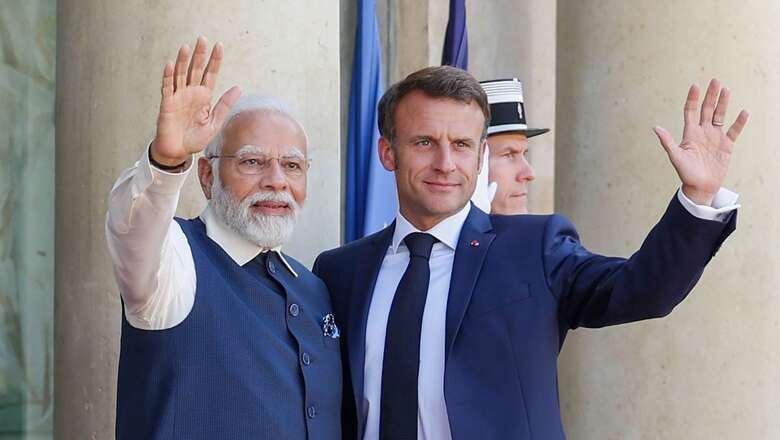
views
During Prime Minister Narendra Modi’s visit to France on July 13 and 14, the two countries agreed to further cooperation in sectors such as defence and outlined a roadmap for the next 25 years of India-France ties. The visit marked 25 years of India and France entering into a strategic partnership and the PM described the two countries’ ties as “being in excellent shape”, and that they are “strong, trusted and consistent.”
France has emerged as amongst the largest exporters of defence equipment to India in the past 10 years. Last year, it was at 29% of India’s market share of defence imports, which placed it second. Thirty-six Rafale fighter jets have already been delivered. A large number of deals, including more Rafale jets, submarines, joint development of combat aircraft engines and helicopters, are also being negotiated and finalised. Some involve joint production and significant technology transfer. This is crucial for India’s defence modernization, diversification of supplies and ‘Make in India’ focus. There is also a convergence in security and economic interests in the Indo-Pacific.
HORIZON 2047
The foreign secretary spoke of the outcomes that had been achieved during this visit and said it is the first time that India has chalked out a Horizon 2047 framework of partnership with any country in the world. He elaborated that it contains “not just aspirations that the two countries think that the relationship can touch, but also has very specific substance to it which this relationship will be filled with”.
2047 is when India will celebrate the 100th year of its Independence and France and India will be celebrate 50 years of our Strategic Partnership. There are 63 specific outcomes divided among multiple pillars. It is a comprehensive approach to how India and France would approach their partnership in the space of security and sovereignty. It doesn’t look at individual transactions, it doesn’t even look at individual segments of it, but at security in the widest possible perspective, and reduces it to what specific things could be achieved by the two countries.
The next is Indo-Pacific, more in terms of providing solutions. Not just to the security or strategic challenges, but also the economic challenges of the Indo-Pacific, as an area of stability and sustainable development. The third is the domain of space, which is at the centre of our partnership. Fourth, is cooperation in the fight against terrorism. Fifth, the shared commitment to promote renewed and effective multilateralism. Sixth, and this is one pillar which has several other crucial sub-segments and this is a space relating to science, technology and academic cooperation between research institutions. Then there are people-to-people ties and engagements.
DEFENCE COOPERATION
The document looks at security and sovereignty in a more holistic and a comprehensive manner, rather than as a set of individual transactions. The reason for that is the metrics of defence partnership are not defined by a single acquisition or a non-acquisition. The India-France Strategic Partnership looks at all elements of engagement where the two countries are committed to cooperating – “co-development and co-production of advanced defence technologies”, including for the benefit of third countries. It also talks of India’s intent to build its own defence industrial and technological base.
For the past several years, the two countries have been undertaking technology partnerships in the field of defence. The defence relationship has been looked at in a very comprehensive manner — listing out the ecosystem of defence engagement between the two countries, a full range of military exercises, military industrial cooperation, research, design, transfer of technology; in some cases, co-production, co-manufacturing, supply chain integration in the manufacturing ecosystem in the field of defence between the two countries; technology value chain integrations going forward between the two countries, with a lot of these linked to the priority of Atmanirbhar Bharat. Hence, the partnership should be looked at from a frame of reference, which is comprehensive, strategic and looks ahead at the entire defence ecosystem.
DEFENCE DEALS
An MoU between Mazgon Dockyard Ltd and Naval Group for the construction of three additional submarines under the P75 programme as well as a roadmap for Cooperation in Advanced Aeronautical Technologies, by supporting the Joint Development of a Combat Aircraft Engine between Safran and DRDO for the Advanced Medium Combat Aircraft (AMCA), have the potential to add significantly to the defence relationship. That India will jointly own the IP for a military jet engine will be a game-changer.
As per Nitin Gokhale, “while this may take up to ten years and billions of dollars in research and development, once achieved, India will become one of the few countries to possess the expertise”.
A Shareholders Agreement between HAL and Safran has been concluded for engine development for the Indian Multi Role Helicopter (IMRH) and that has now got the support of both governments which will make the process faster.
India will also be setting up a Technical Office of the DRDO at its Embassy in Paris to further accelerate the process of high-tech defence collaborations.
However, many analysts were taken by surprise when they found no mention of the 26 Rafale Marine Aircraft in the Joint statement. In fact, before the visit, the focus was on the signing of the deal for these aircraft, a follow-up order for three Scorpene submarines which are being built at Mazagon Docks, the French participation in the SSN submarines being built under Project 75 and the joint development for the AMCA and the engine for the Multi Role Helicopter.
On July 13, the Defence Acquisition Council (DAC) granted the Acceptance of Necessity (AoN) for procurement of “26 Rafale Marine aircraft along with associated ancillary equipment, weapons, simulator, spares, documentation, crew training and logistic support for the Indian Navy from the French Government based on Inter-Governmental Agreement (IGA)”. The DAC had also granted the AoN for procurement of three additional Scorpene submarines under the Buy (Indian) category, to be constructed by Mazagon Dock Shipbuilders Limited (MDL).
The statement said: “Following an international competition launched by the Indian authorities, this decision comes after a successful trial campaign held in India, during which the Navy Rafale demonstrated that it fully met the Indian Navy’s operational requirements and was perfectly suited to the specificities of its aircraft carrier. The Indian Navy’s 26 Rafale will eventually join the 36 Rafale already in service, which are giving full satisfaction to the Indian Air Force, making India the first country to make the same military choice as France by operating both versions of the aircraft to help consolidate its superiority in the air and on the seas and guarantee its sovereignty.”
However, this is only one step in the procurement process the price and other terms of purchase need to be negotiated with the French Government after taking into account all relevant aspects. There will be detailed deliberations and discussions to sort out the finer details before the final announcement. Further, this deal needs to be cleared by the Cabinet Committee of Security (CCS).
There is no doubt that the relationship has evolved over the years from a buyer-seller relationship, from partial to full technology transfer, joint production and now co-development.
CONCLUSION
The Indo-Pacific region, where India is already a member of the QUAD, remains an area of common concern to India and France; hence the roadmap of India-France Cooperation in the Indo-Pacific is important. Both countries share a common vision on this crucial region. Given the interests of both countries in this region, they are also joining hands with other like-minded nations.
This is a period of transformational change in the global order, with growing uncertainty about the future. Relations between India and France have stood the test of time, with France supporting India’s stand on issues ranging from Kashmir to nuclear power. France was also the first country with veto power to support India’s permanent membership in the United Nations Security Council.
The strategic partnership between the two countries gained momentum in the last decade and both countries have shown a willingness to drive this partnership forward. There is a strategic convergence on many global issues, while at the same time both countries attach importance to strategic autonomy. France’s defence industry has demonstrated a commitment to contribute to Atmanirbhar Bharat. There is a high level of mutual trust and shared commitment visible in this relationship cemented to a large degree by their defence ties.
The author is an Army veteran. Views expressed in the above piece are personal and solely that of the author. They do not necessarily reflect News18’s views.



















Comments
0 comment